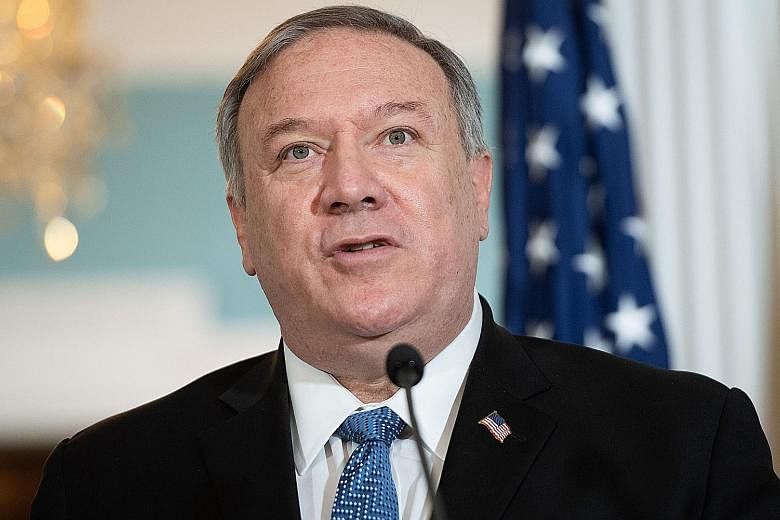WASHINGTON • The US State Department is terminating five Chinese-funded exchange programmes with the United States, calling them propaganda tools for Beijing.
The department said on its website that the programmes are the Policymakers Educational China Trip Programme, the US-China Friendship Programme, the US-China Leadership Exchange Programme, the US-China Transpacific Exchange Programme and the Hong Kong Educational and Cultural Programme.
Secretary of State Mike Pompeo said these programmes - conducted under a US law called the Mutual Educational and Cultural Exchange Act (MECEA) that permits American government employees to travel using foreign government funds - were disguised as cultural exchanges.
"While other programmes funded under the auspices of the MECEA are mutually beneficial, the five programmes in question are fully funded and operated by the PRC government as soft power propaganda tools," Mr Pompeo said, referring to the People's Republic of China.
"They provide carefully curated access to Chinese Communist Party officials, not to the Chinese people, who do not enjoy freedoms of speech and assembly."
MECEA is a 1961 law signed by then President John F. Kennedy and aimed at boosting academic and cultural exchanges with foreign countries.
The Chinese Embassy in Washington did not immediately return a message seeking comment on the move.
Attempts to reach representatives for the programmes singled out by the State Department were not immediately successful.
The termination of the programmes is the latest reflection of President Donald Trump's sharply antagonistic relationship with China.
Under Mr Trump, the US launched a trade war with Beijing, has challenged Beijing's territorial ambitions in disputed Asian waters, criticised its crackdown on freedoms in Hong Kong and blamed China's handling of the initial coronavirus outbreak of the pandemic now engulfing the globe.
Meanwhile, the Trump administration on Friday opted not to grant ByteDance a new extension of an order requiring the Chinese company to divest TikTok's US assets, but talks will continue over the short video-sharing app's fate, two sources briefed on the matter said.
A Treasury Department representative said the Committee on Foreign Investment in the United States (CFIUS) "is engaging with ByteDance to complete the divestment and other steps necessary to resolve the national security risks".
CFIUS had granted TikTok parent ByteDance a one-week extension until Friday over the order.
Mr Trump's August order gave the Justice Department the power to enforce the divestiture order once the deadline expired, but it is unclear when or how the government may seek to compel the divestiture.
Mr Trump was said to have personally made the decision not to approve any additional extensions at a meeting of senior US officials, according to a person briefed on the meeting.
The government had previously issued a 15-day and a seven-day extension of the initial 90-day deadline, which was Nov 12.
The Trump administration contends that TikTok poses national security concerns as the personal data of US users could be obtained by China's government.
TikTok, which has more than 100 million US users, denies the allegation.
Under pressure from the US government, ByteDance has been in talks for months to finalise a deal with Walmart and Oracle to shift TikTok's US assets into a new entity to satisfy the divestiture order.
China, meanwhile, has tightened control of technology exports in a move that promises to complicate any deal for TikTok to sell US assets.
AGENCE FRANCE-PRESSE, REUTERS

